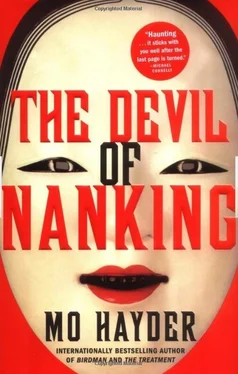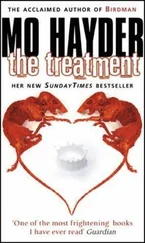Eventually when I’d studied the pages for ten minutes and still couldn’t decide what to do, I crumpled them back into the bag, put the strap across my chest, closed my eyes and turned round and round on the spot, counting out loud. When I reached twenty-five I opened my eyes and, ignoring the strange looks from other pedestrians, headed off in the direction I faced.
I walked round Tokyo for hours, amazed by the skyscrapers like glass precipices, the cigarette and drinks advertising boards, the tinselly, mechanical voices that floated down everywhere I went, making me picture asylums up there in the sky. Round and round I went, directionless as a worm, dodging commuters, cyclists, tiny lonely schoolchildren immaculate in sailor suits, their leather backpacks polished like beetles’ wings. I have no idea how far I walked, or where I went. When the light had gone from the city, the sweat had soaked through my clothes, the strap of the holdall had dug a groove across my shoulder and there were blisters on my feet, I stopped. I was standing in the grounds of a temple, surrounded by maples and cypresses, fading camellias spotting the shade. It was cool in there, and silent, only the occasional shiver of hundreds of Buddhist prayer slips tied to the branches rustling as a breeze moved through. Then I saw, lined up in ghostly silence under the trees, rows and rows of stone child effigies. Hundreds of them, each wearing a hand-knitted red bonnet.
I sat down on a bench with a shocked bump and stared back at them. They stood in neat lines, some holding a windmill or a teddy, some wearing little bibs. Rows and rows of blank, sad faces turned to look at me. They could make you cry, those children and their expressions, so I stood and went to another bench where I didn’t have to look at them. I pulled off my shoes and stripped off my tights. My bare feet felt lovely in the cool – I pushed them out in front of me and wriggled my toes. At the entrance to the shrine there was a bowl of water. It was meant for worshippers to purify their hands, but I went to it and used the bamboo ladle to dribble water over my feet. It was cool and clear, and afterwards I scooped a handful into my mouth. When I had finished and turned back, the stone children seemed to have moved. They seemed to have taken a collective step backwards as if they were shocked by my behaviour in this sacred place. I stared at them for a while. Then I went back to the bench, got a packet of biscuits from my bag and started munching.
I didn’t have anywhere to go. The night was warm and the park was quiet, the great red and white Tokyo Tower all lit up above me. As the sun went down a lamp came on in the trees, and before long the homeless joined me on the surrounding benches. The vagrants, no matter how down and out, all seemed to have little meals, complete with chopsticks, some in lacquered bento lunch-boxes. I sat on my bench eating my biscuits and watching them. They ate their rice and stared back at me.
One of the homeless men had brought with him a pile of cardboard, which he placed near the tiled entrance gate and perched on, naked except for a pair of filthy, stained jogging bottoms, dirt on his round belly. He spent a long time looking at me and laughing – a tiny manic Buddha who had been rolled in soot. I didn’t laugh. I sat on my bench staring at him in silence. He made me think of a photograph in one of my textbooks showing a starving Tokyo man after the war. In that first year when MacArthur set up headquarters, the Japanese lived on sawdust and acorns, peanut shells and tea-leaves, pumpkin stalks and seeds. People starved to death in the streets. The man in my book had a cloth spread out in front of him, two crudely made spoons resting on it. As a teenager I had worried endlessly about those spoons. There was nothing special about them, they weren’t silver or engraved, they were just common little everyday spoons. Probably all that he had left in the world and, because he needed to eat, he was trying to sell them to someone who lacked nothing in the world but two ordinary little spoons.
They called it the bamboo-shoot existence, the onion life, every layer you peeled away made you cry more, and even if you could find the food you couldn’t get it home because dysentery was breeding in the street mud and you might trail it back to your family. Children appeared on the docksides, fresh from independent Manchuria, the ashes of their families in white wisteria boxes slung round their necks.
Maybe that was the price of ignorance, I thought, looking at the naked vagrant. Maybe Japan had to pay for the ignorant things it did in Nanking. Because ignorance, as I’d got tired of hearing, is no excuse for evil.
The homeless were gone when I woke the following morning. In their place, watching me from the bench opposite, his feet planted wide, his elbows on his knees, was a western man of about my age. He wore a salt-bleached T-shirt with the words Big Daddy Blake/Killtime Mix, and a leather thong round his neck, fastened with what looked like a shark’s tooth. His ankles were bare and tanned, and he was smiling as if I was the funniest thing he’d ever seen. ‘Hey,’ he said, raising his hand. ‘You looked so comfortable. The sleep of angels.’
I sat up hurriedly, my holdall falling to the ground. I grabbed up my cardigan and wrapped it round me, batting at my hair, licking my fingers and wiping them hurriedly round my mouth, my eyes. I knew he was smiling at me, giving me that look, the half-wondering look that people always give me.
‘Hey, did you hear me?’ He came to stand next to me, his shadow falling over my holdall. ‘I said, did you hear me? Can you speak English?’ He had an odd accent. He might have been from England or America or Australia. Or all three. It made him sound as if he came from a beach somewhere. ‘Can – you – speak – English?’
I nodded.
‘Oh, you can?’
I nodded again.
He sat down on the seat next to me and put out his hand – pushed straight under my eyes so I couldn’t avoid seeing it. ‘Well, hi, then. I’m Jason.’
I stared at the hand.
‘Said hi. Said I’m Jason.’
I shook his hand hurriedly then leaned sideways so I wouldn’t brush against him, and fumbled under the bench for my holdall. It was always like this at university, the boys all teasing me because I was so defensive, always making me feel like I should just fall into a hole. I found my shoes inside it and began to pull them on.
‘Are those your shoes?’ he said. ‘Are you really going to wear those?’
I didn’t answer. The shoes were quite old-fashioned. They were black, lace-ups, rather stern-looking, I supposed, and thick-soled. They were quite wrong for a hot day in Tokyo.
‘Are you always this rude?’
I pulled on the shoes and began to tie them, pulling the laces tighter than I needed to, my fingers a little white with the pressure. On my ankles the blisters rubbed against the hard leather.
‘Cool,’ he said, amused. He pronounced it kewl. ‘You really are weird.’
There was something in the way he spoke that made me stop tying the shoes and turn to look at him. The sun was coming through the trees from behind him and I got a brief impression of dark hair, cut quite short, with soft flicks at the back of his neck and round his ears. Sometimes, although no one would guess and I would never ever admit it, sometimes all I ever thought about was sex.
‘Well, you are,’ he said. ‘Aren’t you? Weird, I mean. In a nice way. A kind of English way. Is that where you’re from?’
‘I…’ Beyond him the ghostly stone children stood in their lines, the beginnings of the sun touching the branches above them, catching the dew on their shoulders and bonnets. In the distance the calm skyscrapers sent back a reflection of Tokyo as clean and crisp as a cave lake. ‘I didn’t…’ I said faintly. ‘I didn’t know where to sleep.’
Читать дальше












